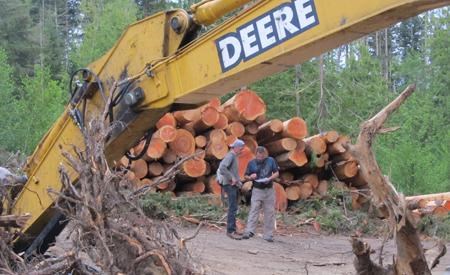With all its protests, rallies and open houses, 2015 was the year of Lot 450. And as the year concludes, the future of Powell River’s urban forest remains to be resolved.
Island Timberlands (IT), the province’s second largest landowner, may have left the trees in the city’s green heart standing for now, but those opposed to the harvest wait for the forestry company’s return.
“This had less to do with stopping logging than it did with stopping vandalism,” said community organizer Jason Down in October.
Stretching from Westview to Wildwood, Lot 450 is the largest parcel of land inside City of Powell River. It includes a large amount of IT-owned, forested land from around the base of Valentine Mountain, alongside the pole line and out to Westview.
Besides owning timber rights on portions of Lot 450, IT also owns rights on over 200 acres of land owned by PRSC Limited Partnership, a landholding corporation created between the city and Tla’amin (Sliammon) First Nation.
In 2014, IT notified PRSC it wanted to use its one-time right to cut the trees. In February 2015, the company and PRSC met to review IT’s harvest plans and talk about how the land would be left after the trees were gone, which IT agreed to leave clear of stumps.
On Earth Day, April 22, the forestry company announced it would begin logging parts of its land inside Lot 450 and exercise its timber rights to the trees growing on the limited partnership parcels within the next year.
The roar of chainsaws in the woods galvanized community opposition to the project. Reaction was swift and a week later over 100 people gathered at a community meeting to share concerns.
Mayor Dave Formosa and a number of city councillors attended the meeting and explained local government could not do anything to stop the harvest, though they did announce a $1.2 million deal to save the trees at Millennium Park, an agreement with IT that took over a decade to finalize.
Pebble in the Pond Environmental Society and other community groups raised funds to hire a biologist to conduct a wildlife and bird-nesting survey of the area.
A bird-nest assessment for the area was released on May 4, which lead the society to call for a halt to logging. Over 30 active nests and a number of blue-listed species were located and documented.
“What it proves conclusively is there are very high wildlife values being threatened by this logging activity and more caution is needed,” said society co-founder Judi Tyabji Wilson.
On May 7, Tyabji Wilson and Jenny Garden of community group Save Lot 450 spoke at city council and raised concerns about IT’s logging practices. A community rally at Willingdon South was held May 9.
On May 19, nine women blockaded an IT feller buncher on the company’s land. “[We are] not against logging but want to see the precious urban forest, home to hundreds of species, logged in a way that protects its ecological integrity,” the women’s statement read.
That action, combined with almost a week of community pickets on Joyce Avenue near the pole line, caught media attention.
Island Timberlands soon announced it would voluntarily halt its logging in the area during the summer, but return in the fall.
The battle for Powell River’s urban forest was quiet during the summer, but at the end of October IT announced it would hold a public open house.
“We had a lot of comments from people who said they understand what’s going on, but they were a little concerned,” said Christopher Dawes, IT’s director of real estate. “There’s always people who distrust and don’t want any changes. What we try to do with these meetings is put forward how we’re going to manage and how it’s going to be good or better.”
Over 140 people attended the meeting. Some vented their frustrations at not being able to ask questions in a town-hall style.
At the meeting Garden announced the formation of Green Heart Environmental Protection Foundation with a mandate to raise money to purchase trees on between 60 to 70 acres of PRSC’s land in Lot 450, with the aim of expanding the protected park land.
PRSC president Clint Williams told those at the open house IT had yet to submit its finalized harvest plans. A timber mark needed to transport the wood off the property would be withheld until the company did so, said Williams.



